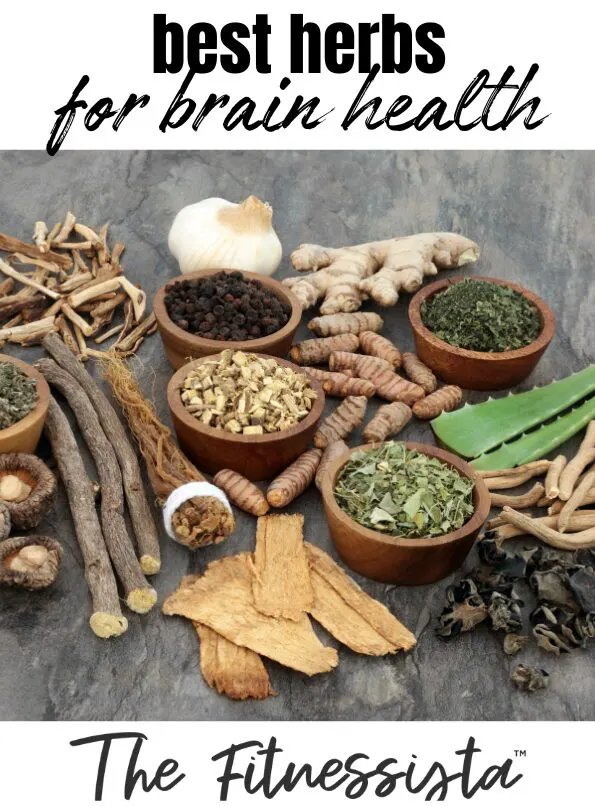Here are some of my favorite herbs for brain health: As always, always consult with your doctor before starting any fitness or nutritional changes or taking any new supplements.
Hello friends! How’s your morning going? I got my nails done today (yay) and I have a coaching call scheduled for the afternoon.
In today’s post I want to say a few words about brain health, a subject that has become particularly interesting and intriguing to me. The work of Dr. Amen.

(I still can’t believe I met him at the Biohacking conference. He was so amazing!)
When it comes to health, brain health is an area that doesn’t get much attention until we feel something is wrong. But just like our bodies, our brains need love and care to stay sharp, focused, and resilient.
Keeping your brain healthy isn’t just about preventing cognitive decline in later life. Whether it’s improving your memory, thinking, or simply reducing brain clutter, it’s also important to start making improvements to your daily life now. Luckily, there are many ways to boost your brain health, some of the safest and most popular being herbs. These handy little plants that you may already have in your kitchen or garden can be powerful in supporting brain function.
Best Herbs for Brain Health
Herbs have been used in traditional medicine for centuries for their healing properties. They are rich in compounds that protect the nervous system, enhance cognitive function, and improve overall brain health. Today, we’ll introduce some of the best herbs for brain health, explain how they work, what you can expect, and how to incorporate them into your daily life. Whether you’re looking to improve memory, increase focus, or support overall cognitive function, these herbs can be natural remedies to help you on your journey. *Note: This is not medical advice. Consult with your doctor before adding any new herbs or supplements.


What is brain health?
Brain health refers to the state of the brain and its ability to carry out various mental processes such as memory, learning, problem solving and maintaining emotional balance. The brain controls everything the body does, from basic survival functions to complex thinking and emotional responses, so it is critical to overall health and wellness. A healthy brain is more resistant to age-related cognitive decline, Alzheimer’s disease and other neurodegenerative diseases. Supporting brain health can improve your quality of life now and keep your mind sharper and more energetic as you age.
What are some herbs that are good for brain health?
1. Ginkgo
Ginkgo is one of the best-known herbs for brain health and is often used to support cognitive function and improve memory. Ginkgo contains compounds called ginkgolides that have been shown to improve blood flow to the brain, increase mental clarity and protect nerve cells from damage. Ginkgo also has anti-inflammatory properties that are thought to help reduce the risk of cognitive decline. It is often used as a natural treatment for Alzheimer’s and other dementias.
Safety Notice: Ginkgo is generally safe for most people when taken in recommended doses. However, it may interact with certain medications, especially blood thinners, so be sure to consult with your healthcare professional before beginning to take it.
2. Gotu kola
Gotu kola is a staple in traditional Chinese and Ayurvedic medicine, prized for its ability to enhance cognitive function and support brain health. The herb contains compounds called triterpenoids that may reduce anxiety, improve memory and increase mental clarity. It is often used to promote longevity and has been studied for its potential to improve cognitive function in patients with cognitive decline and Alzheimer’s disease.
Safety Note: Gotu Kola is considered safe when taken in appropriate amounts. Pregnant or breastfeeding women should avoid taking it unless advised by a medical professional.
3. Bacopa Monnieri
Bacopa monnieri (also known as Brahmi) is another herb that is effective for brain health. It has been used for centuries in traditional Ayurvedic medicine to support cognition, improve memory, and reduce stress. Bacopa is rich in bacosides, compounds that have been shown to protect nerve cells, enhance brain function, and improve blood flow to the brain. It may be especially beneficial for those who suffer from age-related cognitive decline.
Safety Note: Bacopa monnieri is generally safe when taken in recommended amounts. However, it can cause digestive issues in some people, so it is best to start with small doses and consult a healthcare professional if you experience any side effects.
4. Rhodiola rosea
Rhodiola rosea is an adaptogenic herb that helps the body adapt to stress, which can have a significant impact on brain health. Chronic stress is known to negatively affect cognitive function, leading to problems like memory loss, anxiety, and depression. Rhodiola helps counter these effects by lowering levels of stress hormones, improving mood, and increasing mental clarity. It is also being studied for its potential to improve cognitive function and support brain health in those with mental fatigue and burnout.
Safety Note: Rhodiola is generally safe for most people, but should be avoided late at night as it may interfere with sleep.
5. Ashwagandha
Ashwagandha is another adaptogen known for its ability to reduce stress and improve brain function. It has been shown to enhance memory, reduce anxiety, and support overall cognitive performance. Ashwagandha contains compounds called withanolides that have anti-inflammatory and neuroprotective properties, making it an excellent herb for supporting brain health and preventing cognitive decline.
Safety Note: Ashwagandha is safe for most people when taken at recommended doses, however it is not recommended for pregnant women or those with certain autoimmune diseases without consulting a healthcare professional.
6. Turmeric
Turmeric is a powerful anti-inflammatory herb that has been shown to support brain health by reducing inflammation and oxidative stress that can lead to cognitive decline. Curcumin, the active compound in turmeric, is being studied for its ability to improve memory, elevate mood, and prevent neurodegenerative diseases such as Alzheimer’s. Incorporating turmeric into your diet or taking it as a supplement is a simple and effective way to support brain health.
Safety Note: While turmeric is safe for most people, it may cause digestive issues if taken in large amounts. Also, be aware that curcumin is better absorbed when taken with black pepper.
Try this turmeric salad dressing.


Additional Tips to Support Brain Health
Stay active: Regular exercise improves blood flow to the brain, reduces inflammation and promotes the growth of new brain cells.
Eat a balanced diet: A diet rich in antioxidants, healthy fats and low in processed foods protects brain cells and supports cognitive function.
Get enough sleep: Quality sleep is crucial for memory consolidation and overall brain health.
Manage stress: Chronic stress can have a negative impact on brain function, so finding effective ways to manage stress is important.
Herbs naturally support cognition, memory, and overall mental clarity, making them a great addition to your brain health habits. Incorporating these herbs into your daily routine, along with a healthy diet, regular exercise, and proper stress management, can help give your brain the care it deserves and prevent cognitive decline. We always recommend consulting with a healthcare professional before starting any new supplements, especially if you have existing health conditions or are taking medications.
For more information on using herbs to support your health, check out my post on the best herbs for PMS.
Kiss
Gina





